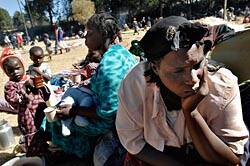Harambee
One of the political cornerstones of modern-day Kenya is harambee. This Kiswahili term can be loosely translated “communal self-reliance” or “pulling together.” Harambee has been an essential element in the relative success of this East African country, which hosts over 40 distinct ethnic groups, many of which live in close proximity to one another.
The violence that has followed December’s presidential elections in Kenya, in which President Mwai Kibaki, a member of the Kikuyu ethnic group, ws challenged by Raila Odinga, a Luo, shocked those who imagined the country was free of the ethnic tensions that plague its neighbors. On Jan. 1, in the town of Kiambaa, 50 Kikuyus were killed after taking refuge in a mud-and-wattle church, which was torched by a mob angered over the election results. Charges of corruption raised by local officials and international observers, like the European Union, enraged some supporters of Mr. Odinga, who vented their anger on neighbors. And Kikuyus fought back. Among the hardest hit areas were the gargantuan slums of Nairobi, Mathare Valley and Kibera, where millions of people eke out a living while dwelling in crowded hovels. Hundreds have been killed, and Kenya, long a host country for refugees from surrounding countries, became itself a source of refugees.
Kenya may be less likely to follow the path into prolonged violence than its neighbors, since many members of these varied ethnic groups have long lived side by side and even intermarried. Yet the rage felt by many Kenyans is exacerbated by their poverty. Only joint talks between Mr. Kibaki and Mr. Odinga will help Kenya in the short term. In the long term, support from the rest of the world can help Kenya help itself, in pursuit of what could be called international harambee.
Feudal Democracy
Benazir Bhutto’s designation of her 19-year-old son, Bilawal, as her political heir and formal leader of the Pakistan’s People’s Party is a metaphor for the political tangle that is Pakistan. The assassinated Ms. Bhutto presented herself as the bearer of popular aspirations for the return of democratic rule, yet the party she led had no democratic process to select a successor from the ranks. At the critical moment, the succession became a matter of bloodlines, with the young man’s father standing in as regent. At the same time, Pakistan is a nuclear-armed state that is unable, and possibly unwilling, to extend the reach of the law to its own tribal territories. It is a U.S. ally in the war on terror, but elements in the military and intelligence establishments have ongoing ties with the Taliban and Al Qaeda. Furthermore, while President Pervez Musharraf’s rationale for emergency measures has been defense against terrorists, he has repeatedly deployed the military and police against his political opponents rather than against Islamic militants. Pakistan offers no ready options. The best that can be hoped for is an orderly transition to democratic rule along with restraint by the military. While ways should be found to thwart further collusion between elements of Pakistan’s military and Islamic militants, the long-term focus of U.S. policy should be on enhancing the institutions of civil society, so that Pakistanis’ desire for democracy can take deeper root.
Games and Rights in Beijing
The 29th Olympiad, to be celebrated next August in Beijing, could offer China a chance to improve its poor human rights record. The executive board of the International Olympic Committee met in December in Switzerland, and human rights organizations are urging it to use the 2008 Olympic Games as an occasion to press for needed reforms. These include ending detention without trial, limiting use of the death penalty (China leads the world) and protecting rights advocates from punishment for opposing government policies.
Amnesty International cites several examples of individuals punished for Games-related opposition activities. One activist, Ye Guozhu, was sentenced to 15 months of “re-education through labor” for preparing banners protesting the demolition of her property for Olympic projects. Far more extreme was the punishment meted out to Yang Chunlin. He was detained and reportedly tortured for his involvement in a petition entitled “We Want Human Rights, Not the Olympics.” Similarly, housing activist Chen Xiaomei died in Shanghai in early July shortly after his release from prison, where he too was reportedly tortured. There have also been ongoing crackdowns on the media, including the imprisonment of journalists.
The principles of the Olympic charter emphasize the importance of “universal ethical principles.” The Olympic committee’s president, Jacques Rogge, M.D., has declared, “We are convinced that the Olympics will improve human rights in China.” But given China’s resistance to outside pressures, many will hear such a statement only with grave reservations.








